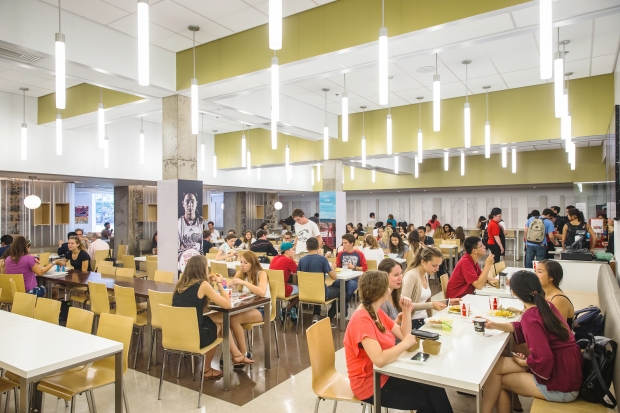As Virginia Woolf said, “One cannot think well, love well, sleep well, if one has not dined well.”
Despite the numerous awards bestowed upon McGill Food and Dining Services (MFDS) over the past years, McGill’s dining halls are just not stepping up to the plate. The slew of praise and recognition for MFDS hides the small but crucial systematic issues with our dining halls: Their extreme price, considerable inconsistency, and lack of choice and transparency.
The mandatory meal plan for first year students in non-apartment style residences costs a whopping $4,575. Compared to the food one could buy outside of McGill, that’s roughly 640 days’ worth of healthy, sustainable groceries, based on a $50 per week budget. But, if you’re not quite ready to become a full adult and live off-campus as a first year student—especially if you are one of the 13,000 students living in Montreal for the first time—you are subject to this extremely expensive and, in my experience, not very delectable meal plan.
Once students get the mandatory meal plan, their lives do not become as carefree as the MFDS website touts—the hours of the five dining halls differ drastically, and are mismatched with the times many students prefer to eat. During the week, dining halls are open on average from 8 a.m. to 9 p.m., but lack hot meals between 2 p.m. and 5 p.m., when hungry, tired students typically return from classes in search of sustenance. During the weekends, dining halls operate from around 10:30 a.m. to 8 p.m., although many students rise well before 10 and undoubtedly go to bed (and search for dinner) long past the early hour of 8.
Although most students have fridges and limited cooking facilities in residence accessible at all hours, these are not large or equipped enough to provide full, balanced meals for every student, as one small kitchenette is generally shared by dozens of students.
MFDS poses added problems for students with dietary restrictions. Gluten free options are present but limited—breakfast choices are generally limited to eggs and potatoes, while classics such as pancakes or french toast are always made with regular, gluten-filled flours. The dinner menu contains the same sides of roasted vegetables and plain rice. The dairy-free choices are just as slim—only soy milk for coffee and cereal, and no replacements for other dairy goods such as yogurt and ice cream. Of course, it is difficult for MFDS to suit everyone, but dietary accommodations would drastically improve the wellbeing of many students.
Further, the lack of transparency makes the system difficult to navigate. Even a month into classes, many first-year students I have met are still unsure of how the dining halls work. Some lucky students are individually advised by kind dining hall staff members of certain “hacks” to the system, including the “five-cent bag” rule, which applies to certain brand-name, taxable items sold in the dining halls. As MFDS does not explain, in order for these items to be purchased through students’ meal plans as opposed to their One-Card accounts, students must ask for an imaginary “five-cent bag” to be charged to their account. Pricing is also unclear, as students often realize the cost of their meal only by the cashier (too late). Another example is the fancy “Ozzy” machines for taking food “to go,” which remain a large mystery to most new students.
MFDS promotes eco-friendliness and student responsibility, and is admittedly similar to neighbouring universities, including Concordia, in pricing, rules, and even sustainability. However, this is no excuse for lack of action in other areas. There are some concrete changes MFDS should make in order to improve effective and enjoyable dining for students. First, adjustments could be made to the pricing of food, such as charging by weight as opposed to fixed portions, thus eliminating the waste of money and food. Along this line of individualized accommodation, McGill must increase the availability of special dietary products. Gluten-free baked goods, non-dairy milks, and vegan-friendly meals, would greatly benefit the hundreds of students with such restrictions in their diets. Additionally, all McGill dining halls should serve hot food throughout the day, without gaps during the day.
Furthermore, some issues could be solved with a “dining hall orientation” for new students upon their arrival at McGill, so that students are not left to sort out the multi-layered system on their own, amid the pressures already involved in transitioning into one’s first year of university.
With some simple structural changes, MFDS will keep its students happier and better fed.










Ee are working on bringing our delicious baked goods that are gluten free, Dairy free and nut free to canada, some products are already available thru distribution